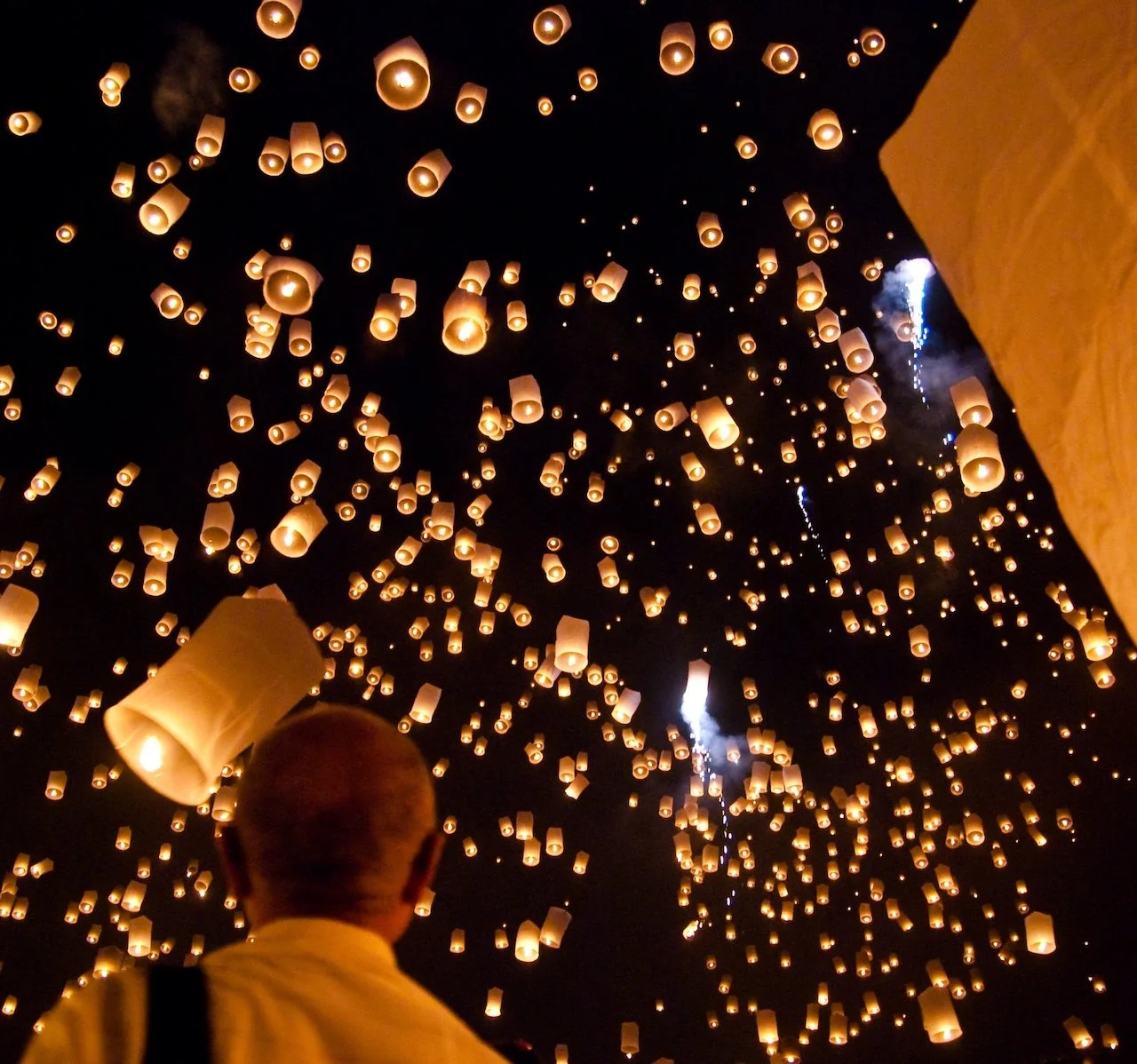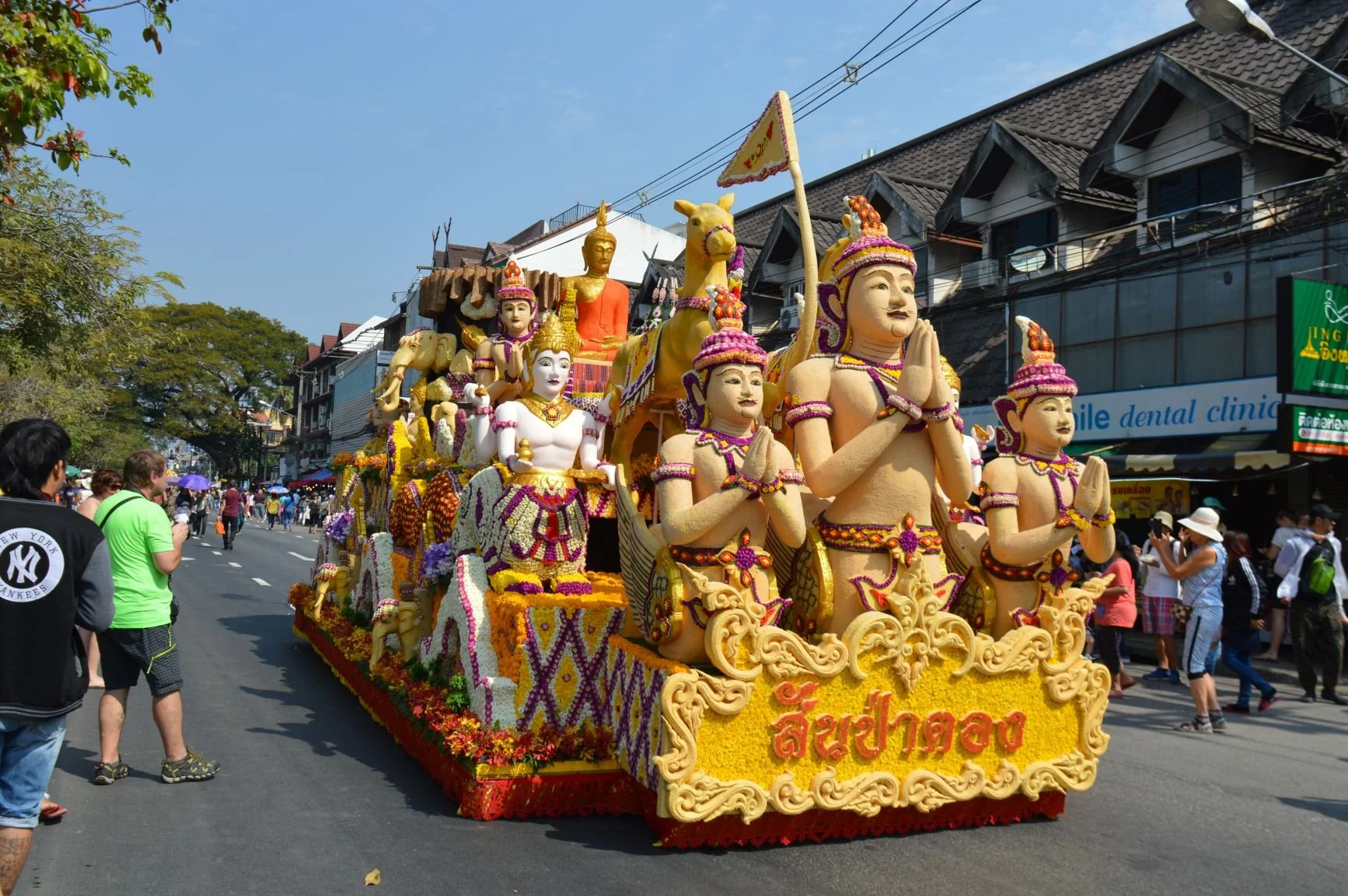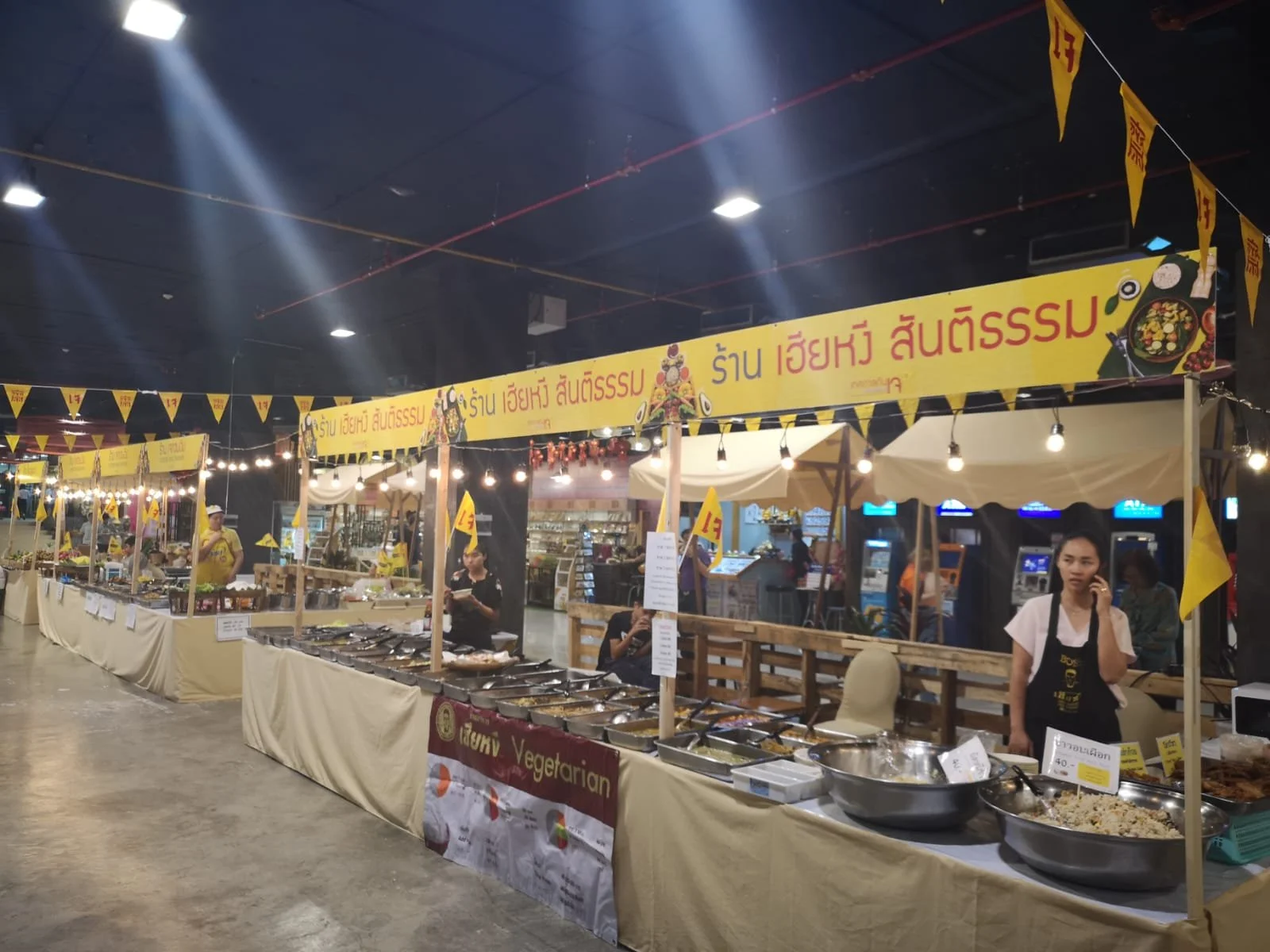Chiang Mai Festivals - The Best Events In The Rose of the North
Nestled in the mountainous region of northern Thailand, the city of Chiang Mai, often referred to as the "Rose of the North," is steeped in rich history, culture, and natural beauty. Known for its ancient temples, vibrant markets, and lush landscapes, Chiang Mai is a cultural hub that attracts visitors year-round. One of the city's most enchanting aspects is its many festivals and cultural events that reflect its unique traditions and heritage.
These celebrations range from religious and spiritual ceremonies to unique modern events, showcasing everything from the striking beauty of lanterns illuminating the night sky to the rhythmic sounds of traditional music echoing through the streets. Participating in these festivals is a great way of engaging with the local culture, experiencing the warmth of Thai hospitality, and gaining insights into the region's beliefs and values. It's well worth checking what's on in the city during your trip or even planning to visit at a specific time for certain celebrations - you can be sure that attending a festival or event in Chiang Mai will put a truly unique twist on your stay. Whether you're a culture enthusiast or simply looking to immerse yourself in a different way of life, Chiang Mai's festivals provide a gateway into the heart and soul of the city.
Here, we explore ten of the most significant festivals and events in Chiang Mai, each with its unique history and experience.
Yee Peng and Loy Krathong
History and Significance: Yee Peng and Loy Krathong are intertwined festivals celebrated in November, reflecting the Thai people's profound spiritual beliefs. Loy Krathong, which means "to float a basket," is believed to have originated from the ancient tradition of paying respects to the water goddess. The krathongs, typically made of banana leaves, are decorated with flowers, candles, and incense. Releasing them into rivers symbolizes letting go of grudges and seeking forgiveness.
Yee Peng, celebrated in the Lanna region, involves the release of lanterns, representing the illumination of the mind and the letting go of negativity. When celebrated together, the two festivals create a stunning visual spectacle of lights and colors, symbolizing hope and renewal. Together, they showcase the beauty of Thai spirituality and community.
What to Expect: The simultaneous celebration creates a magical scene of lanterns in the sky and krathongs on the water. Traditional music, dance, and food stalls enrich the experience. Check out our in-depth blog post for more details on what to expect.
When to Experience: The festival usually falls in November, aligning with the full moon of the 12th lunar month. While specific dates may vary yearly, locals often celebrate over several days.
How to Experience: Visitors can participate by purchasing their lanterns from local vendors. The best viewing spots include the Ping River and various temples. Joining a guided tour can enhance the experience, offering insights into the traditions and significance of the festival.
Songkran Festival
History and Significance: Songkran, the Thai New Year, has been celebrated for centuries and is deeply rooted in Buddhist tradition. The word "Songkran" is derived from the Sanskrit word "saṃkrānti," which means "to move" or "to change." This festival marks the sun's transition into the Aries zodiac sign and is a time for purification, renewal, and family reunions. Historically, water was poured on Buddha statues and the hands of elders as a sign of respect and to seek blessings for the new year. Over time, this respectful act evolved into the playful water fights that define modern Songkran celebrations.
The festival is not only about water; it also embodies themes of family, reconciliation, and the honoring of ancestors, making it a significant time for Thai people to reflect on their lives and relationships.
What to Expect: The festival is famous for its water fights, where locals and tourists splash water on each other to symbolize cleansing and good fortune. The streets are filled with music, laughter, and a vibrant atmosphere.
When to Experience: Celebrated from April 13 to 15, the festivities can last longer, depending on local customs.
How to Experience: To fully enjoy Songkran, equip yourself with a water gun and join the street parties, especially on Nimmanhaemin Road and the Old City. Alternatively, visit temples to participate in the traditional water pouring over Buddha statues for blessings. We have a more detailed blog post about Songkran, which can help you discover how to experience the celebrations yourself.
Chiang Mai Flower Festival
History and Significance: The Chiang Mai Flower Festival celebrates the city's agricultural richness, particularly its diverse array of flowers, fruits, and vegetables. This festival has its roots in the region's historical significance as an agricultural center, where the cool climate allows for the growth of vibrant flowers. It aligns with the blooming season, representing the beauty and abundance of nature.
The festival showcases local flora and emphasizes the importance of community and collaboration among farmers and artisans. It highlights Chiang Mai's identity as a city that values natural resources and celebrates its cultural heritage through floral art.
What to Expect: The festival features vibrant flower displays, parades with beautifully decorated floats, and cultural performances, creating a festive and colorful atmosphere.
When to Experience: The festival takes place annually on the first weekend of February.
How to Experience: Attend the Saturday morning parade, showcasing stunning floral floats. Visit Suan Buak Hat Park, where you can stroll through flower exhibitions and enjoy local crafts and food stalls.
Doi Suthep Pilgrimage Festival
History and Significance: This festival celebrates Wat Phra That Doi Suthep, a sacred temple with a rich history that dates back to the 14th century. According to legend, the temple was built to house a relic of the Buddha, which was discovered by a monk who followed a divine sign. The temple has since become a vital pilgrimage site for Buddhists in Thailand, symbolizing devotion and spirituality.
The Doi Suthep Pilgrimage Festival draws thousands of devotees who undertake a journey to the temple, signifying their commitment to faith and community. The event reinforces the temple's role as a center for worship and reflection, deeply rooted in the spiritual landscape of northern Thailand.
The temple is said to house a relic of the Buddha and is an essential pilgrimage site.
What to Expect: The festival features a procession of devotees ascending Doi Suthep, carrying offerings and chanting prayers. It's a time for reflection and devotion.
When to Experience: The festival occurs annually during the full moon in January.
How to Experience: Join the procession for an immersive experience. The climb up to the temple is steep but rewarding, offering stunning views of Chiang Mai. Local guides can provide insights into the rituals.
Chiang Mai International Balloon Festival
History and Significance: The Chiang Mai International Balloon Festival, launched in 2009, celebrates hot air ballooning as a symbol of friendship and cultural exchange. This relatively new festival has quickly gained popularity, showcasing the beauty of hot air balloons and the spirit of community and cooperation among international participants.
The festival represents Chiang Mai's growing prominence as a destination for international tourism and events, reflecting the city's openness and hospitality. It aims to foster connections among people from different cultures through the shared joy of ballooning.
What to Expect: The festival features colorful balloon displays, night glow events, and family fun activities. It's a sight to behold as balloons light up the night sky.
When to Experience: The festival usually takes place in November, but specific dates vary.
How to Experience: Head to the festival grounds early for the best views. Engage in activities, such as tethered balloon rides or photography sessions, and enjoy food stalls offering local cuisine.
Chiang Mai Craft Fair
History and Significance: The Chiang Mai Craft Fair celebrates the region's rich tradition of handicrafts and artisanal skills passed down through generations. Chiang Mai is known for its vibrant craft scene, producing everything from textiles and ceramics to woodwork and silverware. Historically, the city's artisans have played a vital role in its economy and cultural identity, with craftsmanship rooted in the Lanna Kingdom's heritage.
The Craft Fair promotes local artisans and their creations and aims to preserve these traditional skills in the face of modernization. It highlights the importance of craftsmanship as an integral part of Thai culture, encouraging community involvement and appreciation for handmade goods. This event provides a platform for artisans to showcase their work, fostering connections between creators and consumers.
What to Expect: The fair features stalls from local craftsmen, live demonstrations, and workshops where visitors can learn about the crafting process.
When to Experience: The Craft Fair typically takes place in August, coinciding with the end of the rainy season.
How to Experience: Visit the fair to explore the various stalls and support local artisans. Participate in workshops to learn traditional crafting techniques and take home unique souvenirs.
Chinese New Year
What to Expect: Chinese New Year, or Lunar New Year, has deep roots in Chiang Mai's history, reflecting the city's significant Chinese population. Celebrations honor ancestors and promote prosperity, unity, and renewal. Expect vibrant parades featuring dragon dances, traditional lion performances, and dazzling fireworks. Streets are filled with colorful decorations, while local markets offer festive foods and goods. It's one of the most vibrant times to visit the city!
When to Experience: Celebrations typically occur between late January and mid-February, coinciding with the lunar calendar. Events often span several days, culminating in the new moon.
How to Experience: It's easy to get stuck into the festivities during the Lunar New Year - head to Chinatown, where most of the events occur, to join locals in temple ceremonies, savor traditional dishes, and participate in street celebrations. For more details on making the most of Chinese New Year in Chiang Mai, check out our blog post!
Vegetarian Festival
History and Significance: The Vegetarian Festival, also known as the Nine Emperor Gods Festival, is a significant event in Thai-Chinese culture, rooted in Taoist beliefs. This festival originated in the early 19th century when a group of Chinese opera performers fell ill while performing in Thailand. They vowed to observe a strict vegetarian diet to purify themselves and pay homage to the Nine Emperor Gods. The event has since evolved into a widespread celebration, promoting vegetarianism as a means of spiritual and physical purification.
The festival emphasizes the importance of compassion and respect for all living beings, encouraging participants to abstain from meat and partake in vegetarian meals. It serves as a reminder of the connection between health, spirituality, and environmental awareness, attracting locals and tourists who wish to experience its cultural significance.
What to Expect: Streets are filled with colorful stalls offering delicious vegetarian dishes and processions featuring traditional music and cultural performances.
When to Experience: The festival occurs in October, during the ninth month of the Chinese lunar calendar.
How to Experience: Visit local markets and temples to indulge in the vegetarian offerings. Engage with locals and participate in ceremonies to better understand this spiritual celebration.
Conclusion
Chiang Mai's festivals are not just events but vibrant expressions of the city's cultural identity and community spirit. Each festival offers a unique glimpse into the traditions, beliefs, and values of the people who call this beautiful city home. By immersing yourself in these celebrations, you enjoy the festivities and enrich your understanding of Thai culture, making your visit to Chiang Mai truly unforgettable. Whether it's the mesmerizing sight of lanterns illuminating the night sky or the lively atmosphere of a street festival, Chiang Mai is a magical place.









